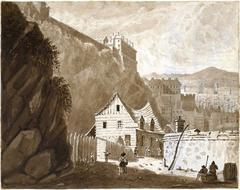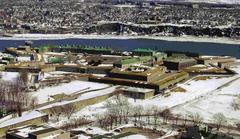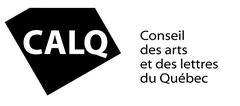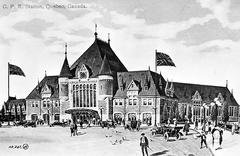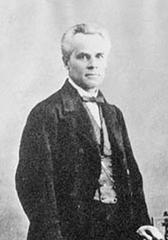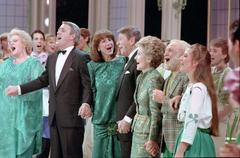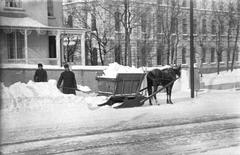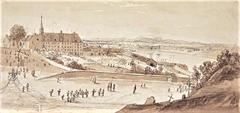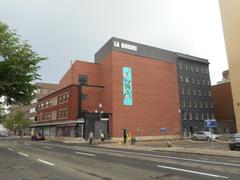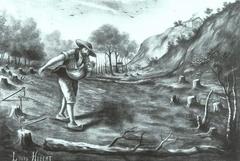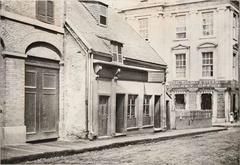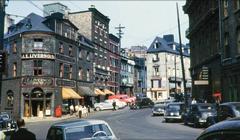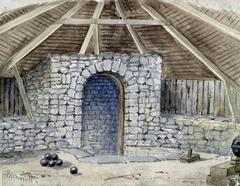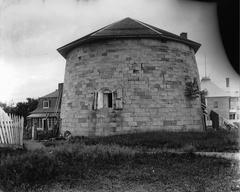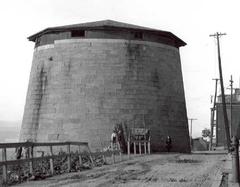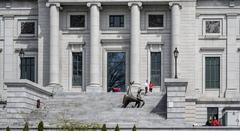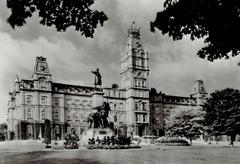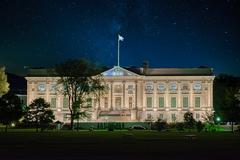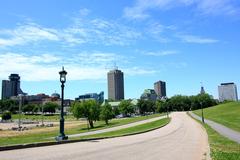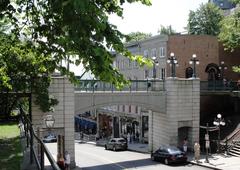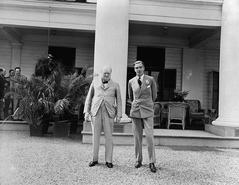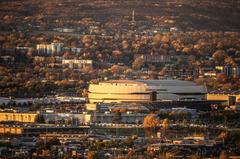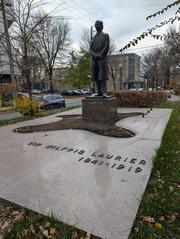
Islamic Cultural Centre of Quebec City: Visiting Hours, Tickets, and Comprehensive Guide
Date: 04/07/2025
Introduction
Nestled in the Sainte-Foy neighbourhood, the Islamic Cultural Centre of Quebec City (Centre Culturel Islamique de Québec, or CCIQ)—also known as the Great Mosque of Quebec City—is a cornerstone of faith, resilience, and cultural diversity in Quebec. Established in the late 20th century amid growing Muslim migration, the Centre has evolved into both a spiritual sanctuary for Quebec’s Muslim population and a bridge for intercultural dialogue within the city (Muslim Community of Quebec; Wikipedia).
The Centre’s significance extends far beyond its role as a mosque. Its modest yet functional architecture, accessible facilities, and ongoing community engagement initiatives reflect its commitment to inclusivity. Perhaps most powerfully, the Centre stands as a monument to resilience and remembrance following the tragic 2017 attack, incorporating memorial elements that honor victims and foster advocacy against Islamophobia (The Canadian Press).
This guide provides detailed, practical information on the Centre’s history, visiting hours, facilities, accessibility, community programs, and recommendations for making the most of your visit.
Table of Contents
- Historical Background and Community Development
- Cultural and Social Significance
- Community Engagement Initiatives
- Visiting Information
- Architectural Features and Facilities
- Visitor Experience and Practical Tips
- Frequently Asked Questions (FAQ)
- Summary and Recommendations
- References
Historical Background and Community Development
Early Foundations and Growth
Quebec City’s Muslim community began to take root in the latter half of the 20th century, as immigrants from North Africa, the Middle East, and South Asia arrived seeking educational and economic opportunities. Initially holding prayers in private homes or rented spaces, the community’s ambition for a dedicated centre culminated in the founding of the CCIQ (Muslim Community of Quebec).
Establishment and Expansion
Founded in 1985, the Centre quickly became a hub for worship, education, and social activities. With the community’s growth, expansion projects—including the MCQ Space Management Project launched in 2023—have increased capacity and modernized facilities (Muslim Community of Quebec). Community volunteers—with expertise in engineering and construction—have been instrumental in these developments.
Community Programs
The Centre offers scholarships, food basket distributions, Ramadan and Eid events, Quranic studies, Arabic language classes, and interfaith dialogues. These programs promote both religious observance and cultural integration.
Cultural and Social Significance
Faith, Identity, and Resilience
The CCIQ is both a sanctuary for Quebec’s Muslims and a symbol of the city’s multiculturalism (Wikipedia; Everything Explained Today). Following the 2017 mosque attack, the Centre became a focal point for remembrance, advocacy against Islamophobia, and community healing (The Canadian Press).
Intercultural Dialogue and Outreach
Open houses, interfaith programs, and cultural events invite people of all backgrounds to visit, learn, and foster mutual understanding. The Centre’s leadership actively collaborates with local organizations and government to advance social justice and pluralism (Wikipedia; CBC News).
Social Services and Advocacy
The Centre supports newcomers, refugees, and families in need through counseling, youth programming, and women’s groups. Annual remembrance ceremonies, public awareness campaigns, and ongoing security measures underscore its dedication to safety and unity (Everything Explained Today).
Community Engagement Initiatives
- Educational Programs: Lectures, seminars, and information sessions on Islamic teachings and contemporary issues are open to all (Wikipedia).
- Social Services: Counseling, youth leadership programs, and support for newcomers and women.
- Cultural Events: Annual open houses, Ramadan programs, charity drives, and interfaith dialogues.
- Memorialization: Remembrance of the 2017 attack is central to the Centre’s identity, with commemorative plaques and public events (The Canadian Press).
- Civic Participation: Advocacy against discriminatory legislation and active involvement in city-wide initiatives.
Visiting Information
Hours and Admission
- General Visiting Hours: 8:00 AM to 8:00 PM daily. Hours may be extended during Ramadan and special occasions. Sunday visits and group tours are often by appointment (Prayers Connect).
- Entry: Free. Donations are appreciated to support community programs.
- Guided Tours: Offered on weekends and by request, especially for groups, schools, and during open houses.
Location and Accessibility
- Address: 2877 Chemin Sainte-Foy, Québec, QC G1V 1W3, Canada
- Accessibility: Fully wheelchair accessible, with ramps, accessible restrooms, and assistance available.
- Transport: Served by RTC bus routes 805 and 806. On-site and nearby parking is available.
Guided Tours and Events
- Guided Tours: Provide insight into the mosque’s history, architecture, and the community’s journey.
- Special Events: Ramadan, Eid, and the National Day of Remembrance on January 29 feature public commemorations and educational activities.
Nearby Attractions
- Old Quebec (UNESCO World Heritage Site)
- Château Frontenac
- Plains of Abraham
- Quebec City National Museum of Fine Arts
- Parc de la Francophonie
- Place Sainte-Foy Shopping Centre
Architectural Features and Facilities
Exterior and Interior
- Exterior: Modest, functional design that integrates with the urban landscape, reflecting both Islamic tradition and local architectural context.
- Interior: Spacious prayer halls for men and women, carpeted and oriented toward Mecca, with natural light and understated decor (Prayers Connect).
Amenities
- Prayer Spaces: Daily and Friday prayers, as well as special events.
- Women’s Facilities: Dedicated spaces for prayer and community activities.
- Ablution (Wudu) Areas: Clean, gender-segregated facilities.
- Restrooms and Parking: Modern, accessible restrooms and ample parking.
- Multipurpose Rooms: Host educational programs, interfaith dialogues, and community meetings.
Visitor Experience and Practical Tips
- Welcoming Atmosphere: Staff and volunteers offer assistance in English and French.
- Dress Code: Modest attire is expected—long pants and sleeves for men, covered arms and legs for women; headscarves are available for visitors.
- Etiquette: Remove shoes before entering prayer halls; maintain respectful silence during prayers.
- Photography: Permitted in designated areas with advance permission.
- Events Participation: Check the Centre’s website or social media for open houses, lectures, and commemorative events.
- Accessibility: Facilities are fully accessible, and assistance can be requested at the entrance.
- Plan Ahead: Arrive early for peak times (Fridays, Ramadan), and contact the Centre for group tours or educational visits.
Frequently Asked Questions (FAQ)
Q: What are the visiting hours?
A: Generally 8:00 AM to 8:00 PM daily; hours may vary during holidays. Check the official website for updates.
Q: Is there an entry fee?
A: Admission is free; donations are welcome.
Q: Are guided tours available?
A: Yes, on weekends and by appointment.
Q: Is the Centre accessible for individuals with disabilities?
A: Yes, with ramps, accessible restrooms, and assistance available.
Q: Can non-Muslims visit and observe prayers?
A: Yes, visitors of all backgrounds are welcome.
Q: Is there parking?
A: Yes, on-site and nearby parking is available.
Q: Can I take photos inside?
A: Ask staff for permission, especially inside prayer halls.
Summary and Recommendations
The Islamic Cultural Centre of Quebec City is more than a mosque—it is a living testament to resilience, multiculturalism, and community. With accessible facilities, welcoming staff, and a focus on both remembrance and education, the Centre offers a meaningful visit for anyone interested in Quebec’s cultural landscape (Muslim Community of Quebec; Wikipedia; Everything Explained Today; Prayers Connect; The Canadian Press; CBC News).
Tips for Visitors:
- Confirm visiting hours and events on the official website.
- Download the Audiala app for prayer times, event notifications, and audio guides.
- Plan to visit nearby historical landmarks for a rich cultural experience.
- Participate in open houses or public events to deepen your understanding of Quebec’s Muslim community.
References
- Muslim Community of Quebec
- Wikipedia - Islamic Cultural Centre of Quebec City
- Everything Explained Today
- The Canadian Press
- CBC News
- Prayers Connect
- Ville de Québec - Tourism

